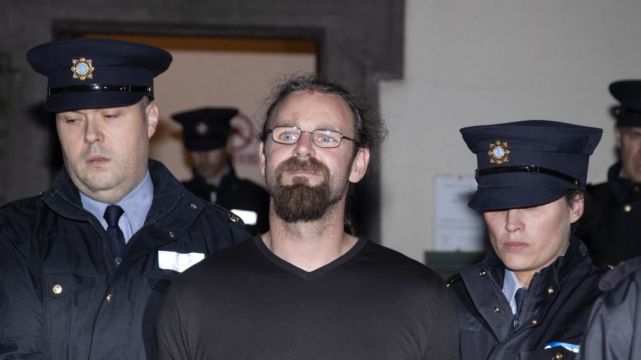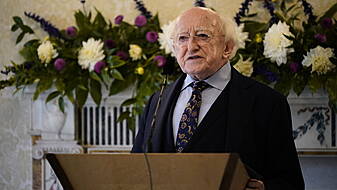Murder accused Stephen Silver suffered from a mental disorder that "contributed significantly" to his actions when he shot and killed Gda Colm Horkan, a consultant psychiatrist has told the Central Criminal Court.
Dr Brenda Wright diagnosed Mr Silver with bipolar affective disorder and said that his mental capacity was diminished by his illness and therefore his responsibility for the act was diminished.
She agreed with defence counsel Roisin Lacey SC that section 6 of the Criminal Law (Insanity) Act says that where a person on trial for murder was suffering from a mental disorder which substantially reduced his responsibility, a jury shall find him not guilty of murder but guilty of manslaughter.
Appropriate defence
The expert witness added: "It is my opinion that the impairment in his thinking, perception, emotion and judgement brought about by his mental disorder contributed significantly to his actions at that time and a defence under section 6 would be appropriate."
Dr Wright further found that Mr Silver's illness was "secondary" to his failure to take medication that had been prescribed to him after he was hospitalised eight months previously. The doctor agreed under cross-examination that Mr Silver had repeatedly decided not to take medication over many years despite medical advice.
Dr Wright, who was called by Mr Silver's defence, told prosecution counsel Michael Delaney SC that she disagrees with Professor Harry Kennedy, also a consultant psychiatrist, who found that Mr Silver may have been in the early stages of a relapse of bipolar disorder but had "significantly intact mental capacity" at the time of the shooting.
Mr Silver (46), a motorbike mechanic from Aughavard, Foxford, Co Mayo has pleaded not guilty to the murder of Det Garda Horkan knowing or being reckless as to whether he was a member of An Garda Siochana acting in accordance with his duty.
He pleaded guilty to manslaughter by reason of diminished responsibility, at Castlerea, Co. Roscommon on June 17th, 2020.
Interviews
Dr Wright told Ms Lacey that in coming to her diagnosis she considered Mr Silver's presentation during three interviews she conducted with him in 2020, his record of 17 previous admissions to psychiatric hospitals, DVDs of interviews he gave to gardaí after arrest and his records from prison and the Central Mental Hospital (CMH).
He first became unwell, she said, when he was 22 years old in 1997, and was admitted to hospital involuntarily eleven times and voluntarily four times up to 2010. He had two further voluntary admissions in 2018 and 2019 before the shooting of Gda Horkan.
Diagnosis
Dr Wright diagnosed the accused with bipolar affective disorder which, she said, is an "enduring and major mental illness characterised by shifts in mood" from depression to elation.
In Mr Silver's case, she said his mood changes were predominantly mania and were accompanied by psychotic symptoms including delusions and hallucinations.
Agitation and aggression, she said, were often present during his relapses and admissions to hospital. She cited examples in 2003 when he injured a member of the nursing staff at one hospital and another in 2004 when he assaulted a garda who was bringing him to hospital.
Assault on security staff
In 2009 it was alleged he assaulted two members of security at a psychiatric department and in 2010 he was noted to be aggressive and violent during an admission.
There was a break in admissions from 2010 to 2018. In 2019 he volunteered to go to hospital but later left and when staff tried to bring him back he assaulted them, Dr Wright said.
Dr Wright said Mr Silver's relapses of bipolar affective disorder are "frequently characterised by aggressive behaviour as a prelude to involuntary admissions."
She said Mr Silver's psychotic symptoms indicate that his disorder is "on the more severe end of the spectrum". She said that his delusions often featured a belief that he was under threat or that "people were out to get him".
She noted that during his garda interviews following the shooting he spoke about a "conspiracy to set him up" and had "grandiose delusions" about his own importance, power, knowledge and identity.
He had on his first admission to hospital in 1997 told doctors that he was on a special mission and that he might be Jesus Christ.
Following the shooting he spoke about being a captain in a reserve cavalry and said that the cavalry would "be coming to avenge him". Grandiose delusions, she said, are characteristics of the illness.
Following his admission to the CMH in June 2020 he said that he could communicate with Gda Horkan, Dr Wright noted. He told doctors that he asked Gda Horkan what he was thinking and added: "What I get from him is regret."
On occasions over the years Mr Silver had experienced auditory hallucinations, she said, sometimes asking him to do things, sometimes comforting him but on other occasions threatening to harm him. She said these are also characteristics of bipolar disorder.
Shooting
Following the shooting, she said there was evidence that he was experiencing disorganised thinking and this continued into July 2020.
On the day leading up to the shooting, she said Mr Silver's presentation "waxed and waned" with one friend who met him in the afternoon saying he behaved normally despite other examples of his behaviour being "not in keeping with his normal self".
He did "doughnuts" on a motorcycle in his repair shop when a customer was present and he gave away a motorcycle to an old acquaintance even though he had very little money, Dr Wright noted.
She said he went from states of elation to anger and added: "That is not unusual when someone is relapsing or in the full throes of their illness."
His illness typically resolved with medication and he was discharged from the CMH back into the prison population in April 2021 having accepted the need to remain on his medication, Dr Wright said. Since returning to prison his condition has remained normal.
Choice on medication
Dr Wright agreed with Mr Delaney, for the prosecution, that over the years Mr Silver had made a choice not to take his medication. She said that he believed he would recognise when he was becoming unwell and would be able to deal with it.
She added: "The difficulty with that is that by the time the patient is aware of the early signs, they are losing the insight they formerly had. The relapse has evolved to the degree that they no longer accept that [they need help]."

She agreed with Mr Delaney that patients facing criminal charges may try to mislead a psychiatrist.
"That is a possibility you would have to consider," she said. She told Mr Delaney that when assessing what a patient tells her she looks for collateral information that might inform her assessment.
She also said that she disagrees with Professor Kennedy when he said that Mr Silver's actions during the struggle with Gda Horkan and in shooting him showed that he was capable of "purposeful acts" and therefore that he had the capacity to form an intent.
She said that purposeful acts can't always lead to the inference that the person had the capacity for specific intent.
Dr Wright's cross-examination will continue on Thursday in front of Mr Justice Paul McDermott and a jury of seven men and five women.







